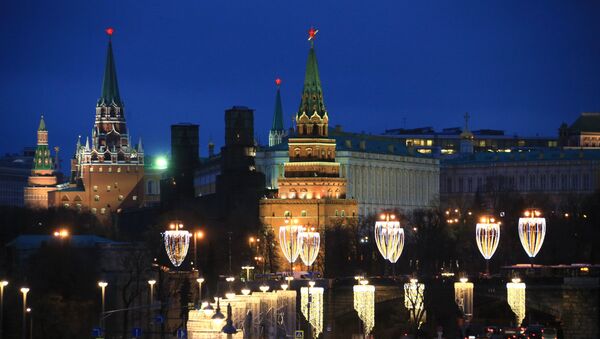"A brief reading of [the strategy], especially the sections, mentioning our country, and as a whole [demonstrates] the imperial nature of the document, there is no desire to refute the unipolar world, there is a persistent unwillingness, rejection of a multipolar world," Kremlin spokesman Dmitry Peskov has stated, commenting on the document.
The spokesman has stated that Russia couldn't agree with the US stance, claiming that the country poses a threat to US security, but has pointed out the positive aspects of the document, such as the readiness for cooperation with Russia in areas of interest for the US side.
"This [position] is absolutely in line with our approach, voiced by the president [of Russia Vladimir Putin], because Moscow is also looking for cooperation with the US where it is beneficial to us, and as far as our American colleagues are ready to go," Peskov said.
As an example of such cooperation Peskov has mentioned the joint work in the fight against terrorism, which helped to prevent terrorist attacks in St. Petersburg.
READ MORE: Kremlin on Putin-Trump Talks: CIA Gave Russia Intel That Helped Foil Terror Act
"Once again I want to recall an ideal example of such cooperation — the exchange of information through special services, which, I repeat, really helped save many lives," Peskov said.
He went to say that Moscow will study the new US national security strategy, noting that the document is large enough and "certainly needs to be studied carefully," pointing out "quite impressive" statements, which "yet to be comprehended."
According to the Russian Foreign Ministry, instead of promoting cooperation between the countries, new US security strategy sparks confrontation among the global community and hampers constructive resolution of the pressing international issues.
"We regret the confrontational nature of the new US National Security Strategy, which was unveiled on December 18. Its key message – ‘to preserve peace through strength’ — sets the line not for a constructive cooperation with other countries on equal basis and in the interests of the joint resolution of existing problems, but for confrontation. Instead of setting the task of building partnership relations, the document demonstrates the desire to maintain a markedly weakened US dominance on the international arena at all costs."
The ministry, however, reiterated Moscow's readiness for partnership with the United States but without Washington's attempts to dictate to Russia and interfere in its domestic affairs.
"The strengthening the economic and military might of Russia and China is being viewed as a challenge to the United States. In other words, Washington clearly does not want to see our countries as strong powers, fearing the complete loss of its former position," the ministry concluded.
The new US National Security Strategy, announced by Donald Trump on Monday, reflects the president's "America first" position and is aimed at returning the country to "unrivaled power," with four main principles: protecting the US populace and the homeland; promoting US prosperity; preserving "peace through strength" and a strong military; and increasing US influence abroad.
Russia's and China's Role in Document
Whereupon, the document calls Russia a "revisionist power" that "wants to shape a world antithetical to US values and interests," with the country's alleged ambition and growing military capabilities, which are claimed create an unstable frontier in Eurasia and increase the risk of conflict.
READ MORE: Aggressive New US Security Strategy Revealed
China also doesn't go unnoticed in the text, together with Moscow it was called a "revisionist power", aiming to change status-quo in the Asian region and having "unfair trading practices."
Chinese Foreign Ministry spokeswoman Hua Chunying has commented on this stance, urging for mutual trust and saying that US-China trade is a win-win situation for both parties.



